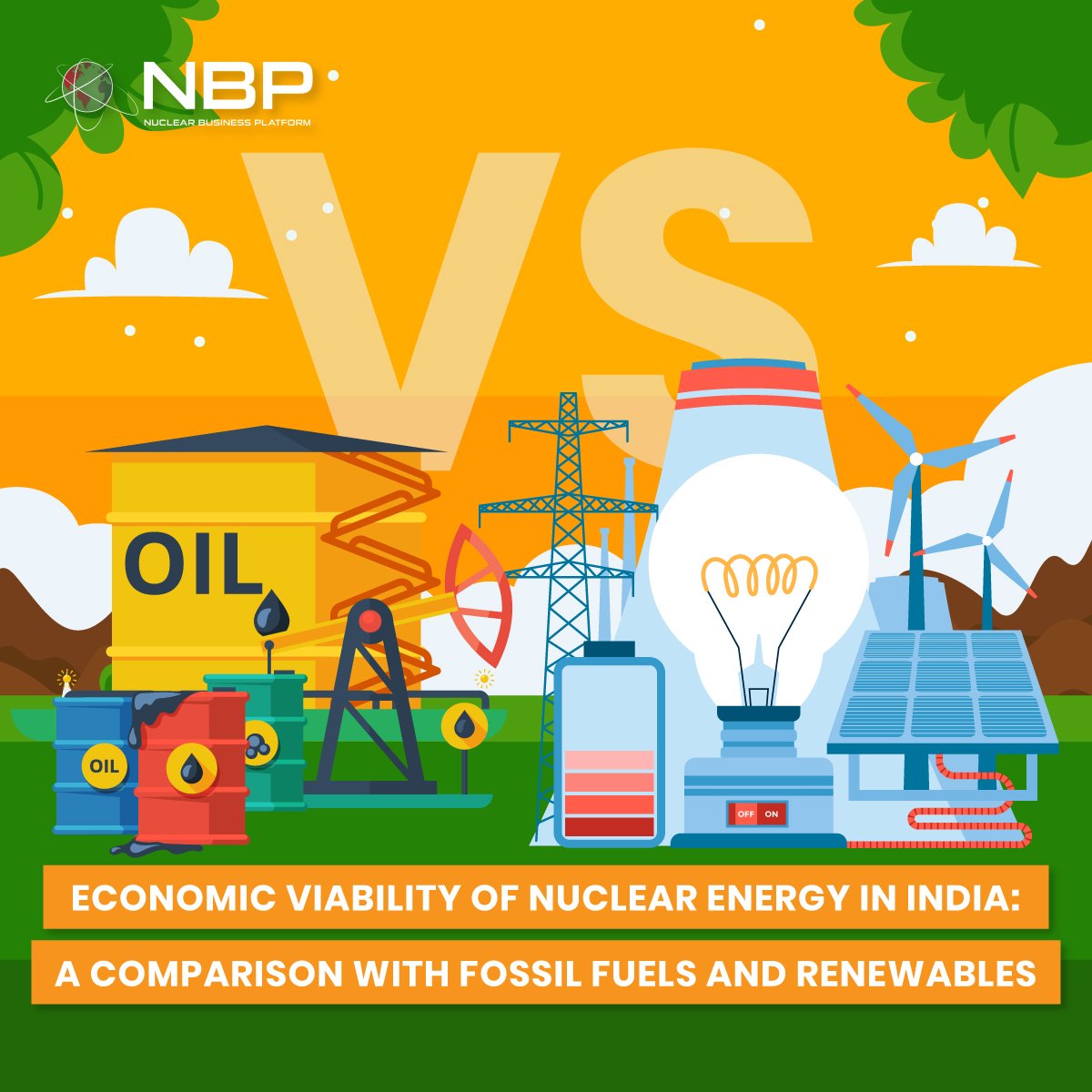Economic Viability of Nuclear Energy in India: A Comparison with Fossil Fuels and Renewables
India’s growing energy demand calls for a diversified and balanced energy mix, with nuclear power playing an increasingly vital role in this transition. As the population approaches 1.4 billion, the pressure on India’s energy sector is intensifying. Over the next two decades, the country’s energy demand is expected to grow significantly, accounting for about 25% of global energy demand growth. By 2031-32, India’s electricity generation capacity is projected to reach approximately 366.4 GW. In response to this rapid expansion, the government has set ambitious targets to meet the growing demand while advancing cleaner, sustainable energy solutions.
Dependence on Fossil Fuels and Energy Security Challenges
India’s energy mix is currently characterized by a heavy dependence on fossil fuels, particularly coal, oil, and natural gas. The total installed capacity from fossil fuels stands at 237.26 GW, accounting for 56.8% of the total energy mix, with coal alone contributing 205.23 GW, or 49.1%. This reliance poses significant challenges to India's environmental objectives and energy security, especially as the country imports over 80% of its oil, leaving it vulnerable to global price fluctuations and geopolitical risks. At COP26, India committed to reducing projected carbon emissions by 1 billion tonnes by 2030 and achieving net-zero emissions by 2070, making the shift towards cleaner energy sources even more critical.
In line with these commitments, India has been actively promoting non-fossil fuel energy. As of now, the total installed capacity of non-fossil fuel sources is 179.32 GW, comprising 43% of the country's energy mix. The Ministry of New and Renewable Energy aims to increase this capacity to 500 GW by 2030. By March 2025, India's installed renewable energy capacity is projected to reach approximately 170 GW, up from 136.57 GW as of December 2023, according to ICRA. India ranks fourth globally in wind power, solar power, and overall renewable energy capacity. By 2030, the country targets about 450 GW of installed renewable energy capacity, with solar energy expected to contribute over 60%, or around 280 GW.
Renewable Energy Limitations and Nuclear Energy's Role in Energy Security
While renewable energy presents clear environmental and economic benefits, it also faces limitations that make it less ideal as a sole solution for India's energy needs. A primary challenge is the intermittency of renewables which creates grid reliability challenges and necessitates backup power sources or costly energy storage systems to ensure a continuous supply, particularly during peak demand. Additionally, large-scale renewable projects require substantial land, which is often scarce in India’s densely populated regions. Moreover, while operational costs for renewables are low, the high cost of advanced energy storage systems to address intermittency increases overall project expenses. As a result, relying solely on renewables may not be sufficient to meet India’s growing energy needs in a cost-effective and reliable manner.
In this context, nuclear energy, with its capacity to provide consistent baseload power and occupy less land, emerges as a crucial complement to renewable energy in India's clean energy transition. Currently, nuclear energy accounts for about 3% of India’s total electricity generation, making it the fifth-largest source of electricity in the country. With 24 reactors supplying 8.18 GW, India has ambitious plans to expand its nuclear capacity. An additional 21 reactors, with a combined capacity of 15.30 GW, are under various stages of development. By 2031-32, India aims to bring online 18 new reactors, adding 13.80 GW, which will increase the total nuclear capacity to 22.48 GW. Looking further ahead, the country targets achieving 100 GW of nuclear capacity by 2047, making nuclear a key pillar in its strategy to ensure energy security and meet its carbon reduction goals.
Why Nuclear Energy is the Most Cost-Effective Solution for India’s Energy Future.
Nuclear energy offers India an ideal solution for reliable, low-carbon electricity due to its long-term economic benefits and cost-competitiveness with fossil fuels. While nuclear plants require significant initial investment, they are relatively inexpensive to operate. Additionally, waste disposal and decommissioning costs are typically included in operational expenses, and when accounting for the environmental and health costs of fossil fuels, nuclear becomes even more competitive.
According to a joint report by the Nuclear Energy Agency (NEA) and the International Energy Agency (IEA), nuclear power is expected to have the lowest Levelized Cost of Energy (LCOE) among dispatchable low-carbon technologies by 2025, ranging from $55 to $95 per MWh. This compares to coal, which could reach $100/MWh, and gas at $80/MWh. Onshore wind’s LCOE is between $40 and $50/MWh, offshore wind ranges from $80 to $110/MWh, and solar PV falls between $40 and $80/MWh.
For nuclear plants in long-term operation, the LCOE drops below $40/MWh, making them the most cost-effective low-carbon electricity source. Nuclear construction costs range from $2,157 to $6,920 per kW for new plants but drop to $391 to $629 per kW for plants in long-term operation, making them highly competitive compared to other sources like wind, solar, and coal.
Hence, nuclear energy offers India a highly cost-effective solution for meeting its growing energy needs while addressing long-term economic and environmental goals. Its ability to provide consistent, low-carbon electricity at competitive prices, particularly in long-term operation, positions it as a viable alternative to the rising costs of fossil fuels and the limitations of renewable sources. Additionally, Indian government’s goal of attracting $26 billion in total private investment further underscores the growing economic appeal of nuclear energy. By combining public and private efforts, India can secure a reliable, cost-effective energy future, reduce reliance on costly imports, and enhance energy security.
The 5th edition of India Nuclear Business Platform (INBP) will take place in Mumbai this 19-20 November 2024. The industry meeting will feature all the officials and players across the Indian nuclear supply chain. For more information on this meeting including exhibition opportunities, click here



